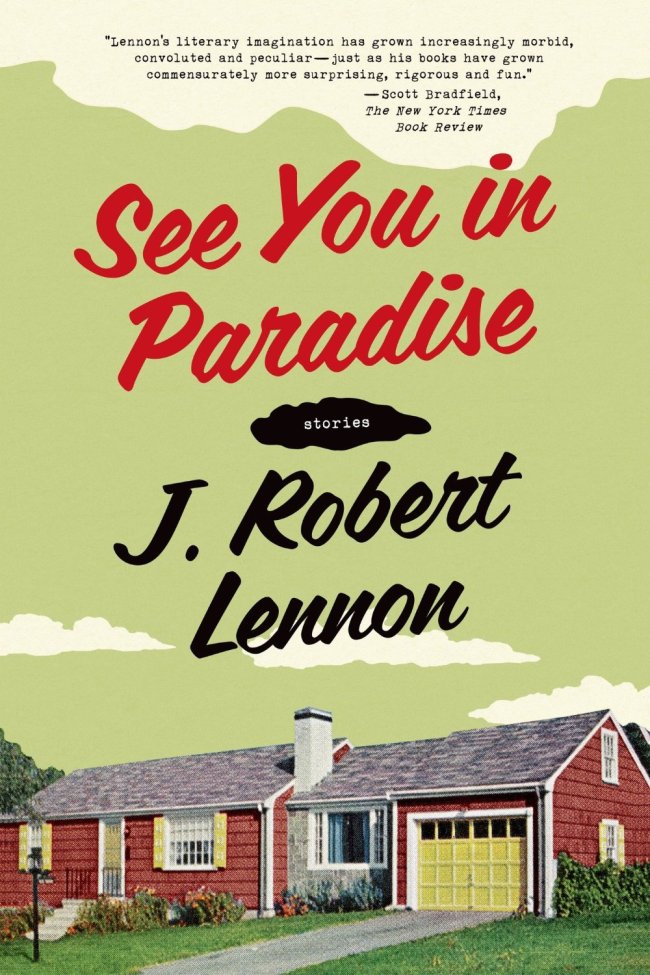
By J. Robert Lennon
(Graywolf Press)
“Most contemporary literary fiction is terrible: mannered, conservative and obvious,” J. Robert Lennon stated on Salon, responding to another acclaimed writer urging students to read any new fiction they can in the major literary magazines and anthologies.
This might be surprising or even hypocritical from Lennon, who is published in elite magazines like Granta and The New Yorker.
But Lennon urges his students to read whatever they are naturally inclined to read. “This includes reading outside one’s genre ― I happen to favor sci-fi and mystery, but I think it’s fine for literary writers to read YA, romance, fantasy or whatever they please. Literary writers are in the privileged position of being permitted to raid any genre for tools to subvert and repurpose.”
This flexibility with genre is immediately apparent in his new short-story collection, “See You in Paradise,” 14 tales covering topics from failing marriages and adoption to zombies, backyard interdimensional portals and wraiths.
In one of the more conventional stories, “Hibachi,” a married couple embrace the cathartic power of kitchen appliances. Phillip is hit by a car, leaving him paralyzed from the waist down. His wife, Evangeline, is supportive but unreadable. Their circle of friends slowly disappears.
It opens with Phillip making reservations at a hibachi restaurant as a belated anniversary celebration. He prefers to stay home but knows Evangeline enjoys the Japanese food. They are “seated ― with great fussing and wringing of hands over Phillip’s wheelchair, so eager is the staff to avoid pissing off their first cripple ― between a small family glumly celebrating a teenager’s birthday and a pair of college-age lovebirds with their arms wrapped around each other.”
Evangeline intently watches the chef perform, and Phillip orders her a hibachi grill of her own. She becomes obsessive in the kitchen, and for the first time since the accident they try to rekindle their passion.
The piece climaxes when the friends who abandoned them experience Evangeline’s new chef skills, a captivating performance that erupts in a final moment of exultant revenge.
“Zombie Dan” explores the process of raising the dead and what to do once they come back, a scenario that seems eerily plausible.
The scientific community “figured out how to bring people back to life ― not everybody, just some people ― and this is what happened to our friend Dan Larsen. He had died falling off of a yacht, and six months later, there he was, driving around in his car, nodding, licking his pale, thin lips, wearing his artfully distressed sport jackets and brown leather shoes.”
The narrator is an estranged old friend enlisted by Dan’s mother to help him regain his sense of self after being “revived.” He and several other acquaintances talk with zombie Dan, trying to bring him back to full consciousness. In the process, the narrator rekindles his romantic relationship with another childhood friend, Chloe.
Unfortunately, reviving people leaves them a bit off. In zombie Dan’s case, it gives him the unnerving ability to see through all the pretenses to the sins and secrets beneath.
“It remembers things about me that I worked very, very hard to forget. It is an offense against nature,” the mother says of her son. The only person drawn to this new Dan is Chloe, who moves in with him, much to the narrator’s chagrin.
Dan’s mother plays on that jealousy and offers money to kill her son. “Killing a human being is murder,” she tells the narrator. “Killing a zombie is a public service. Especially one with dangerous powers. My son is dead, and his body has been stolen by a monster. A monster that is (expletive) your girlfriend.”
The narrator’s moral struggle explores what the soul really is in a tale that is equal parts comical and unnerving.
Using these unusual and comic methods, Lennon’s collection takes on the strange nature of domestic life in America. Ultimately, he navigates a surreal world populated with vibrant characters struggling for meaning in a banal and weary everyday life. (TNS)
-
Articles by Korea Herald



![[Exclusive] Korean military set to ban iPhones over 'security' concerns](http://res.heraldm.com/phpwas/restmb_idxmake.php?idx=644&simg=/content/image/2024/04/23/20240423050599_0.jpg&u=20240423183955)

![[Graphic News] 77% of young Koreans still financially dependent](http://res.heraldm.com/phpwas/restmb_idxmake.php?idx=644&simg=/content/image/2024/04/22/20240422050762_0.gif&u=)



![[Pressure points] Leggings in public: Fashion statement or social faux pas?](http://res.heraldm.com/phpwas/restmb_idxmake.php?idx=644&simg=/content/image/2024/04/23/20240423050669_0.jpg&u=)










